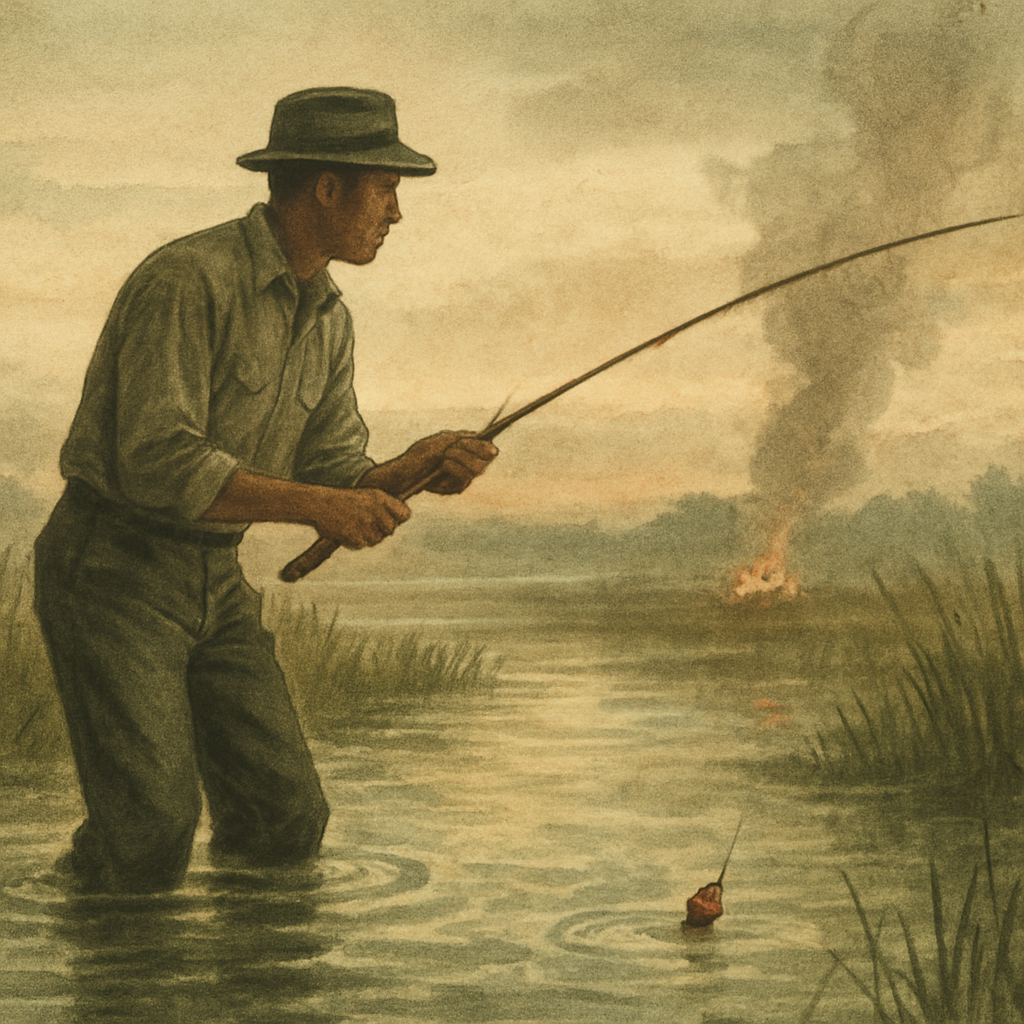
Tail on the Flats, Cedar Smoke, and the Quiet Beckoning of Dawn
Dawn comes clean over the marsh. Water is glass in places, rough in others where the wind stitches the grasses. The air is damp with salt and old smoke. The day begins with silence and a small, stubborn breath of heat from last night’s fire. A few ember sparks drift toward the sky, then fall back into the cedar smoke we left at camp. It smells of wood, of meals half eaten, of a boat that knows more than the hands that tend it.
We slide into the flat, the boat moving with a quiet creep along the spartina lines. The grass stands tall, green and stout. The troughs between the blades hide fish and questions. A tail flicks; a redfish there, not yet sure of us, not yet certain of the morning. The corks pop with a sharp friendly sound, like a closing door after a long night. We watch the line bend, a stubborn arc that tells the truth before any words do. It’s not loud work. It’s the stubborn work of feeling water and fish at the edge of a flat where the horizon has not decided what it wants to be.
The light grows. Cedar smoke climbs from the camp site, curling into the still air above the flats. It’s not loud, this smoke, just a reminder that a man can carry warmth with him if he stays careful. The tide moves in and out with the patience of a watchful dog. We ride it, not forcing any moment, simply waiting for the shadow of a tail to push the surface a fraction of an inch. Corks rise and fall, towing lines through the long green grass, a bright sign in a low dawn. A redfish looks up from the mud and the fight begins with a pause, as if the fish is listening to the beat of our hearts and deciding if it will answer.
The flats hold the world in their quiet way. The grass rustles with the breath of fish and small crabs, the kind of sound that fills a man’s chest when there is nothing else to fill it with. We learn to read the water by its shifts and the way the line feels, a thin thread of truth that tells us what the fish already know. It’s a patient sport, this marsh fishing, the kind of work that requires a steady hand and a stubborn mind. When the tail finally appears, it does so with a confidence born of water and weather and the calm hand that has waited long enough. The rod straightens a little, the line sings, and the fish comes toward us with a stubborn, noble grace that makes all the planning seem simple and right.
The morning wears on. The embers from camp hover and glow, never quite burning out, a small mercy against the chill that tries to creep up along the spine. We move with a rhythm born of boats and grass and weathered nets. It is not perfect. We miss a strike now and then, misread a wake once or twice, learn to forgive the moments when the line judges us more than we judge the line. But we stay, because the coast asks for it, because the water is a patient teacher and the fish a patient friend. The cedar smoke fades into the morning heat, and the flats keep giving back what the heart can take and then some, if you’ve got enough quiet to listen.
Gear Used
- YETI Rambler 20 oz Tumbler — keeps coffee hot on a damp dawn
- Costa Del Mar Fantail PRO Sunglasses — glare cuts through marsh glare cleanly
- Hobie Mirage Passport 12 Kayak — stable platform, easy to maneuver
- Shimano Stradic FM Spinning Reel — smooth retrieve across grass and mud
The morning taught me to keep the line light and the mind heavier. We learned what the wind would not tell us, what the water’s face would not show until we nudged it with our patience. The gear held. We learned from it, and that is what saved us when the sun climbed a little higher and the first true push of heat found our backs. We fumbled at times, sure, but we kept the faith of the flats and the faith of the fire in the cedar smoke. It was enough to walk back toward camp with the line clean and the heart quiet, knowing tomorrow would ask again and we would answer in kind.
The marsh keeps its own quiet, and we keep learning how to listen.